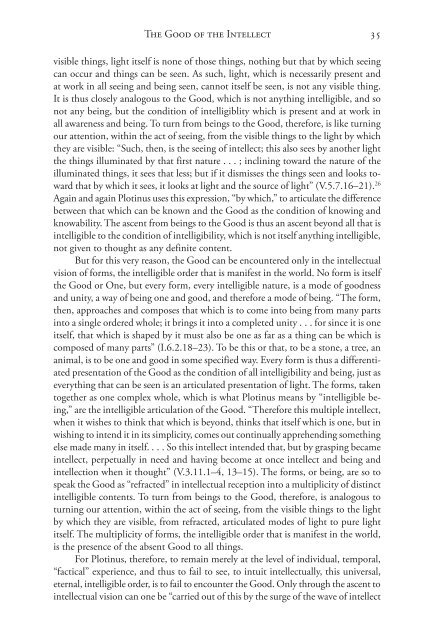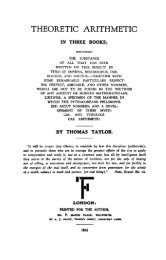Perl - The Good of the Intellect.pdf - Platonic Philosophy
Perl - The Good of the Intellect.pdf - Platonic Philosophy
Perl - The Good of the Intellect.pdf - Platonic Philosophy
You also want an ePaper? Increase the reach of your titles
YUMPU automatically turns print PDFs into web optimized ePapers that Google loves.
<strong>The</strong> <strong>Good</strong> <strong>of</strong> <strong>the</strong> <strong>Intellect</strong> 35<br />
visible things, light itself is none <strong>of</strong> those things, nothing but that by which seeing<br />
can occur and things can be seen. As such, light, which is necessarily present and<br />
at work in all seeing and being seen, cannot itself be seen, is not any visible thing.<br />
It is thus closely analogous to <strong>the</strong> <strong>Good</strong>, which is not anything intelligible, and so<br />
not any being, but <strong>the</strong> condition <strong>of</strong> intelligiblity which is present and at work in<br />
all awareness and being. To turn from beings to <strong>the</strong> <strong>Good</strong>, <strong>the</strong>refore, is like turning<br />
our attention, within <strong>the</strong> act <strong>of</strong> seeing, from <strong>the</strong> visible things to <strong>the</strong> light by which<br />
<strong>the</strong>y are visible: “Such, <strong>the</strong>n, is <strong>the</strong> seeing <strong>of</strong> intellect; this also sees by ano<strong>the</strong>r light<br />
<strong>the</strong> things illuminated by that first nature . . . ; inclining toward <strong>the</strong> nature <strong>of</strong> <strong>the</strong><br />
illuminated things, it sees that less; but if it dismisses <strong>the</strong> things seen and looks toward<br />
that by which it sees, it looks at light and <strong>the</strong> source <strong>of</strong> light” (V.5.7.16–21). 26<br />
Again and again Plotinus uses this expression, “by which,” to articulate <strong>the</strong> difference<br />
between that which can be known and <strong>the</strong> <strong>Good</strong> as <strong>the</strong> condition <strong>of</strong> knowing and<br />
knowability. <strong>The</strong> ascent from beings to <strong>the</strong> <strong>Good</strong> is thus an ascent beyond all that is<br />
intelligible to <strong>the</strong> condition <strong>of</strong> intelligibility, which is not itself anything intelligible,<br />
not given to thought as any definite content.<br />
But for this very reason, <strong>the</strong> <strong>Good</strong> can be encountered only in <strong>the</strong> intellectual<br />
vision <strong>of</strong> forms, <strong>the</strong> intelligible order that is manifest in <strong>the</strong> world. No form is itself<br />
<strong>the</strong> <strong>Good</strong> or One, but every form, every intelligible nature, is a mode <strong>of</strong> goodness<br />
and unity, a way <strong>of</strong> being one and good, and <strong>the</strong>refore a mode <strong>of</strong> being. “<strong>The</strong> form,<br />
<strong>the</strong>n, approaches and composes that which is to come into being from many parts<br />
into a single ordered whole; it brings it into a completed unity . . . for since it is one<br />
itself, that which is shaped by it must also be one as far as a thing can be which is<br />
composed <strong>of</strong> many parts” (I.6.2.18–23). To be this or that, to be a stone, a tree, an<br />
animal, is to be one and good in some specified way. Every form is thus a differentiated<br />
presentation <strong>of</strong> <strong>the</strong> <strong>Good</strong> as <strong>the</strong> condition <strong>of</strong> all intelligibility and being, just as<br />
everything that can be seen is an articulated presentation <strong>of</strong> light. <strong>The</strong> forms, taken<br />
toge<strong>the</strong>r as one complex whole, which is what Plotinus means by “intelligible being,”<br />
are <strong>the</strong> intelligible articulation <strong>of</strong> <strong>the</strong> <strong>Good</strong>. “<strong>The</strong>refore this multiple intellect,<br />
when it wishes to think that which is beyond, thinks that itself which is one, but in<br />
wishing to intend it in its simplicity, comes out continually apprehending something<br />
else made many in itself. . . . So this intellect intended that, but by grasping became<br />
intellect, perpetually in need and having become at once intellect and being and<br />
intellection when it thought” (V.3.11.1–4, 13–15). <strong>The</strong> forms, or being, are so to<br />
speak <strong>the</strong> <strong>Good</strong> as “refracted” in intellectual reception into a multiplicity <strong>of</strong> distinct<br />
intelligible contents. To turn from beings to <strong>the</strong> <strong>Good</strong>, <strong>the</strong>refore, is analogous to<br />
turning our attention, within <strong>the</strong> act <strong>of</strong> seeing, from <strong>the</strong> visible things to <strong>the</strong> light<br />
by which <strong>the</strong>y are visible, from refracted, articulated modes <strong>of</strong> light to pure light<br />
itself. <strong>The</strong> multiplicity <strong>of</strong> forms, <strong>the</strong> intelligible order that is manifest in <strong>the</strong> world,<br />
is <strong>the</strong> presence <strong>of</strong> <strong>the</strong> absent <strong>Good</strong> to all things.<br />
For Plotinus, <strong>the</strong>refore, to remain merely at <strong>the</strong> level <strong>of</strong> individual, temporal,<br />
“factical” experience, and thus to fail to see, to intuit intellectually, this universal,<br />
eternal, intelligible order, is to fail to encounter <strong>the</strong> <strong>Good</strong>. Only through <strong>the</strong> ascent to<br />
intellectual vision can one be “carried out <strong>of</strong> this by <strong>the</strong> surge <strong>of</strong> <strong>the</strong> wave <strong>of</strong> intellect
















